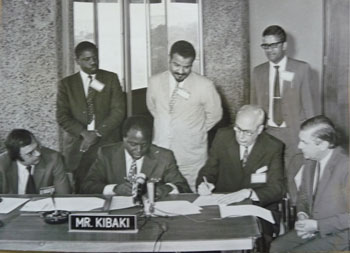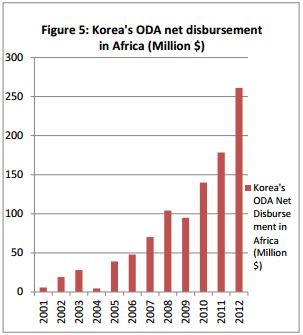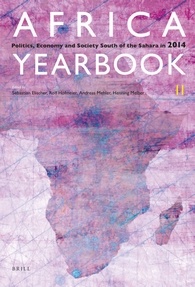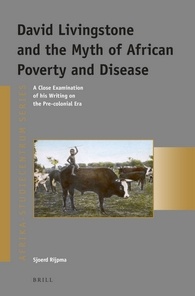New publications
New publications by ASCL staff and affiliates, and new books in our series, are frequently highlighted on this website. You may also use this RSS feed to keep informed. All recently added publications can be found in our database.
 A new ASC working paper reviews Dutch development policies for the years 1949-2015, with particular attention for private sector development (PSD). Since the beginning, Dutch government has strongly supported policies stimulating private sector and economic development in the Netherlands and in developing countries. PSD took a central role as it was assumed that poverty could only be alleviated when a country’s economy is stimulated. The long history of Dutch development cooperation shows continuity in its approach towards development policy as a way of promoting Dutch businesses and export in developing countries.
A new ASC working paper reviews Dutch development policies for the years 1949-2015, with particular attention for private sector development (PSD). Since the beginning, Dutch government has strongly supported policies stimulating private sector and economic development in the Netherlands and in developing countries. PSD took a central role as it was assumed that poverty could only be alleviated when a country’s economy is stimulated. The long history of Dutch development cooperation shows continuity in its approach towards development policy as a way of promoting Dutch businesses and export in developing countries.
 One of the last articles that our late colleague Stephen Ellis (1953-2015) completed, has recently been published by African Affairs, the journal of which Stephen was a co-editor 2003-2007. The article, co-authored by Mark Shaw (director of the Centre of Criminology, University of Cape Town) and entitled 'Does organized crime exist in Africa?' has been published Open Access to allow as many people as possible to read it.
One of the last articles that our late colleague Stephen Ellis (1953-2015) completed, has recently been published by African Affairs, the journal of which Stephen was a co-editor 2003-2007. The article, co-authored by Mark Shaw (director of the Centre of Criminology, University of Cape Town) and entitled 'Does organized crime exist in Africa?' has been published Open Access to allow as many people as possible to read it.
 This new ASC Infosheet focuses on the relations between South Korea and Africa. South Korea’s primary goal in establishing diplomatic relations in the 1980s was its own political recognition. After it was admitted to the United Nations and recognized as a state, the country’s interest in Africa waned. In the mid-2000s South Korea began to take diplomatic relations with Africa seriously again, establishing trade relations, as well as official development assistance.
This new ASC Infosheet focuses on the relations between South Korea and Africa. South Korea’s primary goal in establishing diplomatic relations in the 1980s was its own political recognition. After it was admitted to the United Nations and recognized as a state, the country’s interest in Africa waned. In the mid-2000s South Korea began to take diplomatic relations with Africa seriously again, establishing trade relations, as well as official development assistance.
 The Africa Yearbook 2014 covers major domestic political developments, foreign policy and socio-economic trends in sub-Saharan Africa, all related to developments in 2014. It contains articles on all sub-Saharan states, each of the four sub-regions, an article on continental developments and one on African-European relations. The book is a joint effort of the Africa Institute of South Africa, The Nordic Africa Institute, the German Institute of Global and Area Studies and the ASC Leiden. For this edition, Klaas van Walraven, co-editor of the first ten volumes, wrote the chapter on Niger.
The Africa Yearbook 2014 covers major domestic political developments, foreign policy and socio-economic trends in sub-Saharan Africa, all related to developments in 2014. It contains articles on all sub-Saharan states, each of the four sub-regions, an article on continental developments and one on African-European relations. The book is a joint effort of the Africa Institute of South Africa, The Nordic Africa Institute, the German Institute of Global and Area Studies and the ASC Leiden. For this edition, Klaas van Walraven, co-editor of the first ten volumes, wrote the chapter on Niger.
 Ethiopia hosts migrants and produces migrants; it hosts diasporas and produces diasporas. It is precisely at that interface between Ethiopia and its diasporas, that this special issue of African Diaspora is situated, Giulia Bonacci writes in her introduction. ASC researcher Rijk van Dijk is editor-in-chief of African Diaspora, which is published by Brill. The journal seeks to understand how African cultures and societies shape and are shaped by historical and current diasporic and transnational movements.
Ethiopia hosts migrants and produces migrants; it hosts diasporas and produces diasporas. It is precisely at that interface between Ethiopia and its diasporas, that this special issue of African Diaspora is situated, Giulia Bonacci writes in her introduction. ASC researcher Rijk van Dijk is editor-in-chief of African Diaspora, which is published by Brill. The journal seeks to understand how African cultures and societies shape and are shaped by historical and current diasporic and transnational movements.
 Margot Leegwater's PhD thesis has been published in the African Studies Collection. Her study examines the effects of land-access and land-tenure policies on local community relations, including ethnicity, and land conflicts in post-conflict rural Rwanda. Violence has historically often been linked to land, and the current growing resentment and fear surrounding these land-related policies and the ever-increasing land conflicts could jeopardize Rwanda's recovery and stability. Leegwater succesfully defended her PhD dissertation on 16 September at the VU University Amsterdam.
Margot Leegwater's PhD thesis has been published in the African Studies Collection. Her study examines the effects of land-access and land-tenure policies on local community relations, including ethnicity, and land conflicts in post-conflict rural Rwanda. Violence has historically often been linked to land, and the current growing resentment and fear surrounding these land-related policies and the ever-increasing land conflicts could jeopardize Rwanda's recovery and stability. Leegwater succesfully defended her PhD dissertation on 16 September at the VU University Amsterdam.
 David Livingstone and the Myth of African Poverty and Disease is an unusual book. After a close examination of Livingstone's writings and comparative reading of contemporary authors, Sjoerd Rijpma has been able to draw cautious conclusions about the relatively favourable conditions of health and nutrition in southern and central Africa during the pre-colonial period. The surprise awaiting travellers in and also before 19th century Africa was that the inhabitants of the interior, even the 'slaves', were healthier and better fed than many Europeans. Sadly, Sjoerd Rijpma died on 6 February of this year.
David Livingstone and the Myth of African Poverty and Disease is an unusual book. After a close examination of Livingstone's writings and comparative reading of contemporary authors, Sjoerd Rijpma has been able to draw cautious conclusions about the relatively favourable conditions of health and nutrition in southern and central Africa during the pre-colonial period. The surprise awaiting travellers in and also before 19th century Africa was that the inhabitants of the interior, even the 'slaves', were healthier and better fed than many Europeans. Sadly, Sjoerd Rijpma died on 6 February of this year.
 ASC researcher Walter van Beek and William C. Olsen (editors) and the contributors to this volume of essays seek to understand how Africans have confronted evil around them. Grouped around notions of evil as a cognitive or experiential problem, evil as malevolent process, and evil as an inversion of justice, the essays investigate what can be accepted and what must be condemned in order to evaluate being and morality in African cultural and social contexts. The studies of evil entanglements take local and national histories and identities into account, including state politics and civil war, religious practices, Islam, gender, and modernity.
ASC researcher Walter van Beek and William C. Olsen (editors) and the contributors to this volume of essays seek to understand how Africans have confronted evil around them. Grouped around notions of evil as a cognitive or experiential problem, evil as malevolent process, and evil as an inversion of justice, the essays investigate what can be accepted and what must be condemned in order to evaluate being and morality in African cultural and social contexts. The studies of evil entanglements take local and national histories and identities into account, including state politics and civil war, religious practices, Islam, gender, and modernity.

